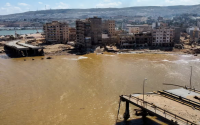August 29, 2002The Guardian
In Britain there is no debate about an Iraq war because nobody important is prepared to make the case in favour. This is the big change that's become clear as summer ends. The demand that Tony Blair should inform a national argument before committing to a war was originally made out of apprehension on the part of people who didn't want one. They thought he might sweep into Baghdad behind George Bush without a word of discussion.
But the demand has been overtaken by events. If debate is what counts, it was won before it began. Opposition has assembled on an imposing scale before a word is spoken on the other side. Fewer than 20% of voters say they would support British involvement. Ministers, previously anxious to satisfy the Americans, have started running for cover from their own people.
In America, until recently, the position was the opposite. There was no debate because nobody dared to make a case against. The Democrats were, and still are, silent. The pro-war case, crudely pushed by Bush and regularly explained by the leading civilians in the Pentagon, kept being made with little counter-attack even in the press. There were doubts, but the cogent articulation all came from the other side. This may have something to do with the poll finding that 69% of Americans are in favour of a military assault on Saddam Hussein.
Things have now changed in Washington, but the US remains the best - the only - place to hear the argument for war. This is as it should be. The US is the only actor that will count, and the only place outside Kuwait and maybe a few Gulf states where there's any significant lust for getting rid of Saddam by this means. If that didn't exist, nobody would be contemplating war, in Britain or anywhere else. Inside the British government, the motor of discussion is in any case not to do with the pros and cons of an attack but entirely with the usual British obsession: how to play the Americans, within the illusion of our special relationship. A bathetic and increasingly ignoble priority, given what's at stake in the Middle East and the world, but none the less the one that Whitehall refuses ever to reconsider.
Listening to the argument in the US, one has to accept it is serious and sincere. It's not all about hidden agendas, though some of those who make it should probably be required to register as pro-Israeli lobbyists.
America, say the apologists, is hugely strong. There's no axiomatic need for the world to remain in thrall to Saddam. We have the means to expel and kill him, and thereby start to turn a resource-rich and educated people from the millstone to the lodestone of the region. For Iraq is not Afghanistan, living in the middle ages. Nor is it Iran, in thrall to militant Islam. With one fell swoop of courage and commitment, we can bring a better life to Iraqis and stability to their neighbours. Seize the day.
Seize it, moreover, for the sake of America's own security. Saddam has seriously menacing biological weaponry, even if one rules out the nuclear. He may use it. He may already be doing business with al-Qaida, and now's the chance to wipe this linkage out. America, the case goes, has a duty to do this, and now, with September 11 still a hideous memory in many minds, is the moment when it can be done. To do it would be a glorious not an infamous assertion of the new world order: a virtuous match between the new global terrorism and the newly unencumbered power that has the means to vanquish it.
Inside this case, though seldom mentioned, is also oil. The price of crude has risen 50% since the war talk revved up, adding to economic gloom in the US, but the war party doesn't care. More on their minds is Iraq's oil-richness. This adds harsh self-interest to windy speculations about ending terrorism, bolstering the belief of those who press a passionate case not just for regime replacement but era change. This war case, as vice-president Dick Cheney showed, is ever stronger in the mind of the president. But now at last it is being countered by voices that matter.
Bush, who detests the challenge of an argument, doesn't like this. Nor does defence secretary Donald Rumsfeld, who still seems to be pretending that all Iraq discussion is redundant. But I believe what beckons is, at last, a debate of some grandeur about America's role in the world.
Brent Scowcroft started this, and James Baker has followed it up. These are momentous Republican voices. Scowcroft, the first George Bush's intimate security adviser, asked the war party a list of painful questions about what they thought they were doing: who their allies would be, what sort of mayhem they were prepared to wreak in the region, what exactly they thought should follow Saddam. Baker, who was not only Reagan's secretary of state but the heavy hitter sent to Florida to secure the disputed election for Bush Two, surprised his friends by insisting that the UN must have a far bigger role than the White House envisages.
These people aren't against regime change in Iraq. But they're in favour of geopolitical coherence. Henry Kissinger, though typically Delphic in his advocacy, has staked out the same ground against the impetuous ideologues who simply want to seize the day.
This doesn't necessarily make war less likely. But it changes the terms. Coming from within the party, and amplified by other Republicans on the Hill, it poses a major challenge not to Bush's warrior ambitions but to his revulsion from what's called nation-building. What Scowcroft and other elders are pointing out is that things are nothing like as simple as the anti-Saddam missionaries seem to think. To claim, as Cheney did on Monday, that acting is less risky than not acting is nowhere near good enough. The demand now irretrievably on the table is for Bush to recognise that he cannot demolish Saddam without committing to rebuild Iraq, with all the attendant risks. If he wants to embark on this adventure, there's no way it can be done as a short-haul project.
The US, in other words, can't bomb and run, still less invade and run. That's what they hoped for in Afghanistan, where they're already pushing to get out, even as warlordism resumes. After an invasion of Iraq, it would be suicidally unrealistic. The only future, in terms of the Middle East peace Bush claims as the object of all this, requires a US security presence and huge political commitment for years to come.
Yet that runs counter to everything these hard-right Republicans came into office preaching. It envisages a return to the paternalistic American reach of the post-war era. It would be shockingly offensive to a bunch of gut isolationists, many of whom do not carry passports. But the discussion has begun to make things clear. Reality presses inexorably in. Either Bush and Cheney and the rest of the gang will become nation-builders, which they've been telling Americans is a terrible idea. Or they will have to abandon their plan for going to war with Saddam Hussein.






